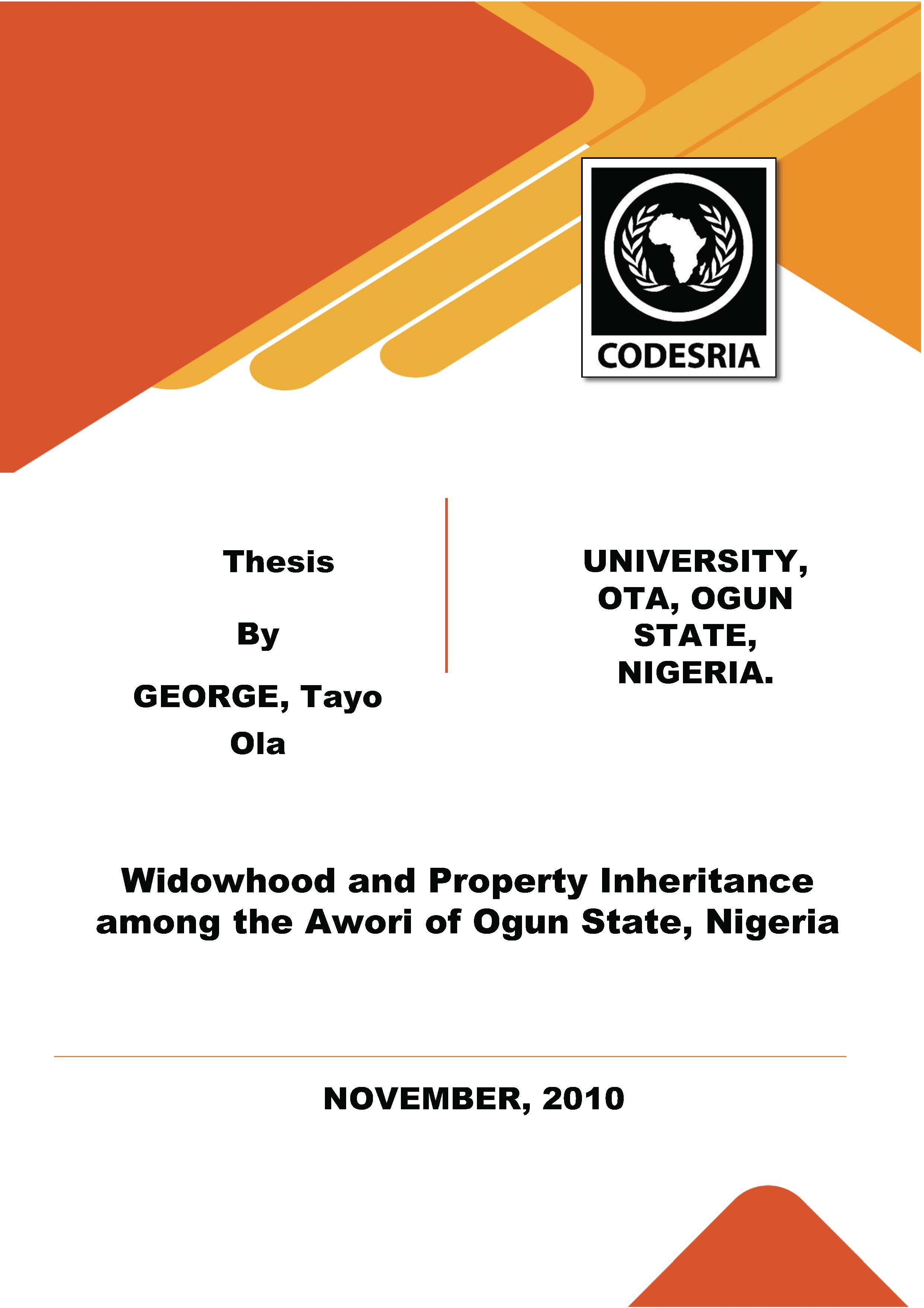Widowhood and Property Inheritance among the Awori of Ogun State, Nigeria
Keywords:
Inheritance, property rights, women's status, widowhood, NigeriaSynopsis
The subservient position of women and the level of di scrimination that accompanies ·widowhood practices and property sharing is an acknowledged social problem f n many societies, widowhood ~esulting from sudden death gives ~room for a will or other preparations. Thus, property inheritance becornes a big challenge. Most stud ies on widowhood practices in Nigeria for in stance, focus on the Southeast and Northern part of the country. The gap detected in the litera ture and research on the subject as it re lates to the Awori sub-ethnic group of the Yoruba race is what this study intends to fill. Against this background, th e study examines the traditional practice of widowhood and property inheritance among the Awori of Ado-Odo/Ota Loca l Government Area of Ogun State, Nigeria. Thi s study was carried out in six selected Awori communities: Agbara, Atan, Jju, Ilogbo, Igb~sa and Ota. The study was anchored on two th eoretical platforrns: tructural Functionalist Theory and the Feminist Political Economie Theory. Using a triangula tory proces , both quantitati ve (s urvey method) and qualitative ( lDls/KI Is, FGD and case studies) were used in co ll ecting the primary data. Widows, widowcrs, rn arri ed men and women, se nior c itizens, trad itional ru !ers and rel igious leader (in the stu C: y are a) const ituted the study popul at ion. The purpos ive and snowball sarnp ling techn ique were adopted usin g a 65-item questionna ire containing bath open and closed ended questions. The personal interview method wa...the in strument to Awori widows of different age categories and religions. Of the 997 copies administered, 982 were du ly compl eted and returned, rep rescnting 98 .5 percent completion rate. 942 were adjudged usa ble fo r analys is, ernploying frcquency di stribut ion, impie percentages, cross tabul ations, and linea r regress ion ta va lidate the three hypoth eses formulated for the stud y. For hypothes is 1, the independent variable wh ich include: (age, eduation. occupation, incarne and type of marri age(personal attrib utes of widows)were te ted again st widowhood practices and property inheritance. The result frorn the rcgress ,on analysis revcal. th at educati on of widow is signilïcantly and negative lyrclated ta widowhood rit e at ap value of. This was...by wiJows with tert iary education who dcclined from ob erving widowhood rites cornparcd to thcir counterpan without schoo ling...
Downloads
References
Abe, G. O. (1993). “Ethics and African Societies: The Perspectives of African Traditional Religion, Christianity and Islam” in Abe G. O. (ed.) African Journal of Biblical Studies Vol. 8 No1. Ilorin: Nigerian Association for Biblical Studies (NABIS).
Aboki, Y. (1997). “Property Rights of the Customary and Islamic Law Spouse in Divorce Issues Problems and Proposal for Reform” Rights of Children and Women in Divorce by Olonade, A. and Ipaye, T., (Lagos: Franchard Publisher for Fredrick Foundation).
Adepoju, A. (1997). Family, Population and Development in Africa Zed Books Ltd, London New Jersey.
Aderinto, A. A. (2000). “Wives of the Graves: A Study of Widowhood Rites and Wife Inheritance in Ondo and Ekiti States” in Rights and Widowhood Rites in Nigeria Published by Inter-African Committee (Nigeria) on Traditional Practices Affecting the Health of Women and Children, Lagos, Nigeria. Monograph Number 3.
Ado-Odo/Ota Local Government Area, Ota. (2008) Handbook Ota.
Afigbo, A. E. (1989). “Widowhood Practices in Africa: A Preliminary Survey and Analysis”, Proceedings of Better Life Programme for Rural Women Workshop on Widowhood Practices in Imo State, Owerri: Government Printer, June 6-7, p.12.
Afonja, S. (1979), “Current Explanations of Sexual Inequality: Reconsideration” Nigerian Journal of Economic and Social Studies, Vol.21, No.2, p. 22-30.
Afonja, S. (1981), “Changing Modes of Production and Sexual Division of Labour among Yoruba”, Signs Vol.7, No.2, p.122-135.
Ahonsi, B. (1997). “Society, Culture and the Status of Widows in Contemporary Nigeria: A Gender Analysis” In Owasonoye, B. and Ahonsi, B., Widowhood in Nigeria: Issues, Problems and Prospect, Lagos, Friedrick Ebert Foundation and Human Development Initiatives.
Aidoo, A. K. (1988). “Women and Food Security: The Opportunity for Africa” Development; Vol.2, No. 3. p.34.
Aina, O. I. (1998). “Women, Culture and Society” in Amadu, S. & Adetanwa, O. (eds.), Nigerian Women in Society and Development. Dokun Publishing House, Ibadan, p.30-32.
Aina, O. I. (2007) “The Gender Equality Women Empowerment (GEWE) Agenda and the Nigerian Development” Paper presented at ISA International Laboratory for Ph.D. Students in Sociology on Globalization, Social Problems and Social Policy, November 2007, p. 18-23.






